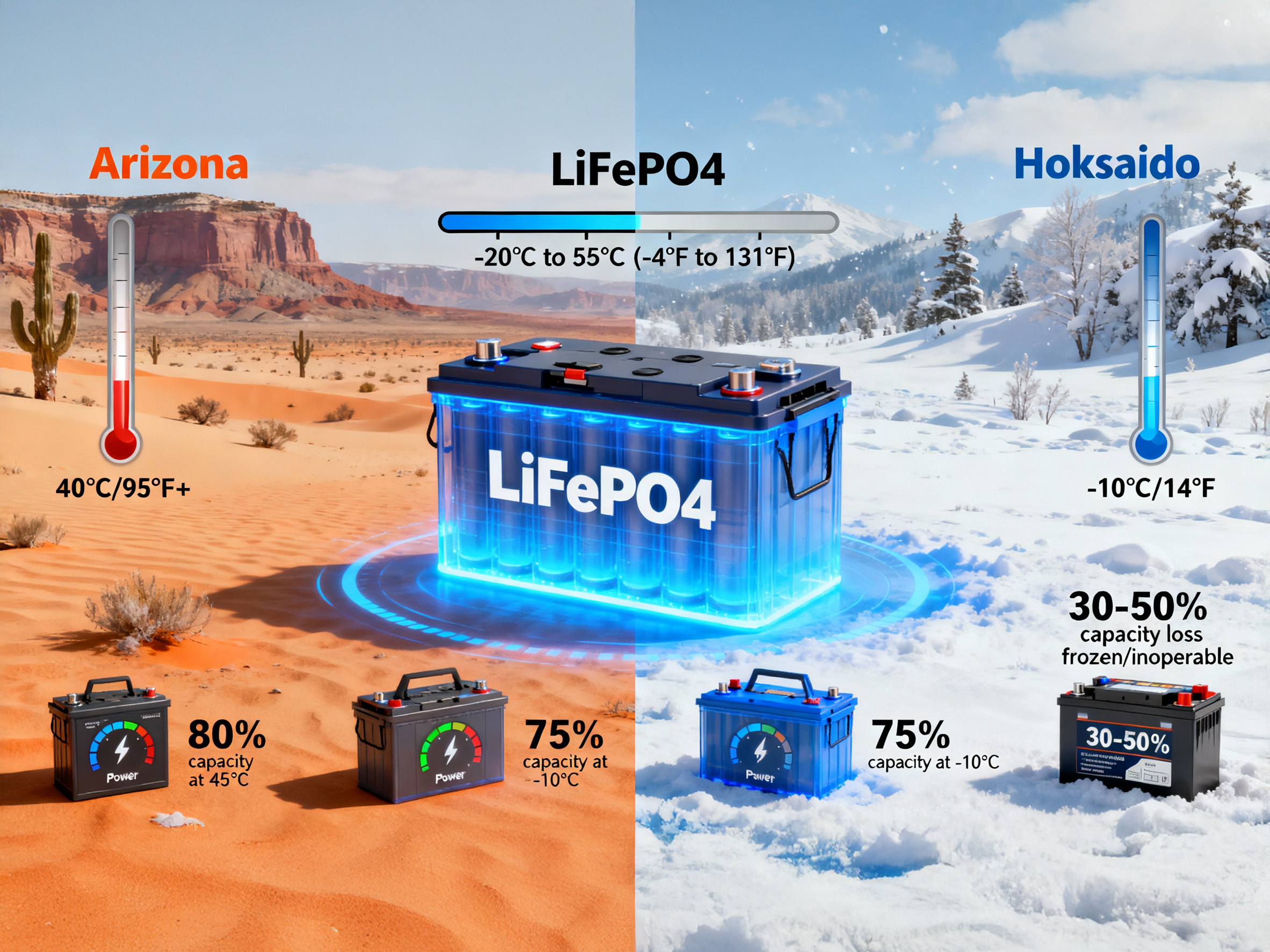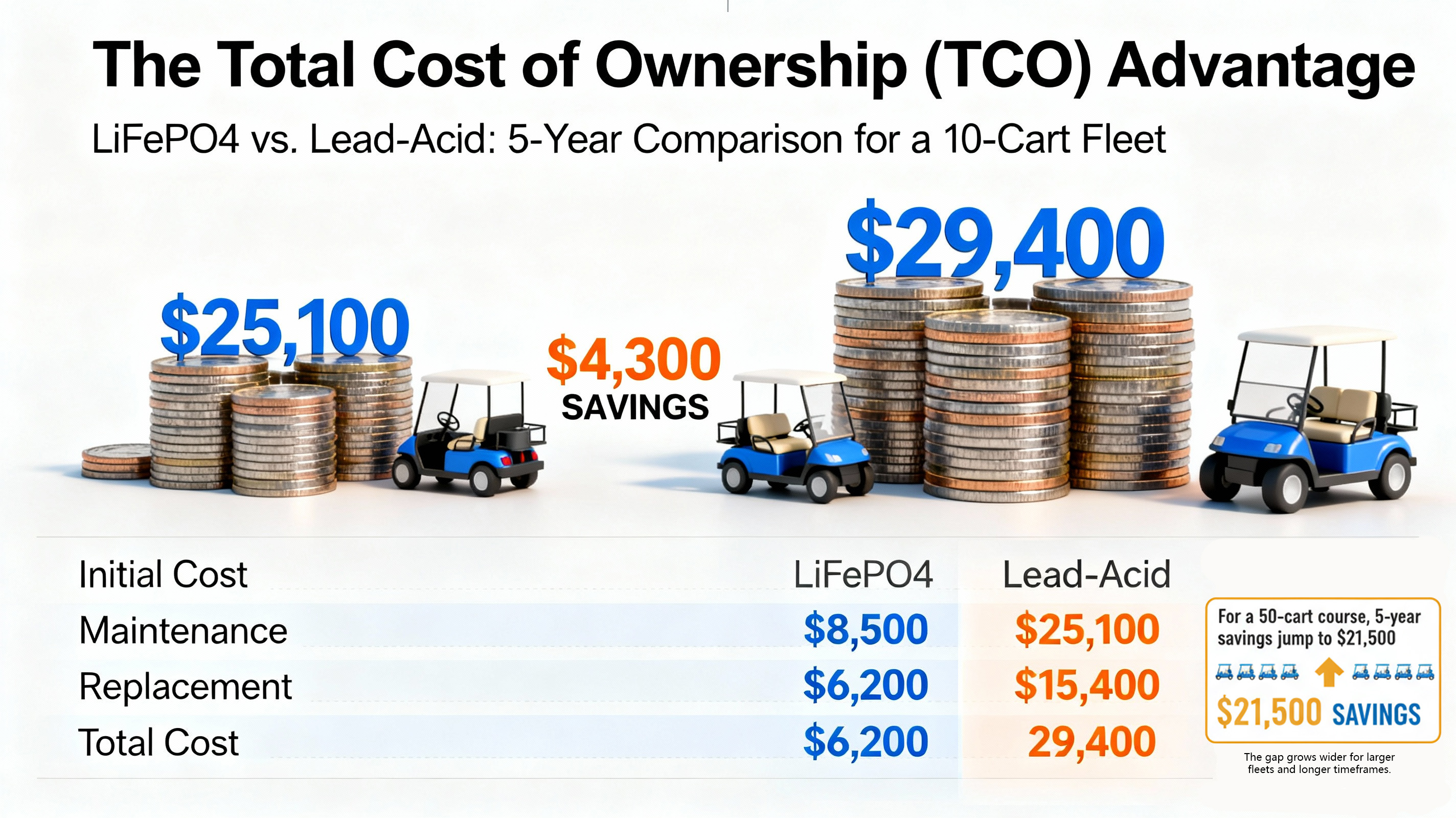For golf course operators, resort managers, and private golf cart owners across the U.S., Southeast Asia, and Australia, the battery is the unsung hero of daily operations. Traditional lead-acid batteries often fall short—succumbing to frequent replacements, weather-related failures, and high upkeep costs. Lithium Iron Phosphate (LiFePO4) batteries, however, have rewritten the rulebook, turning operational headaches into seamless efficiency. Here’s how they’re elevating golf cart performance worldwide.
What Makes LiFePO4 Batteries a Game-Changer for Golf Carts
The shift to LiFePO4 isn’t just about “new technology”—it’s about solving the specific pain points that plague golf cart fleets. These batteries stand out for four irreplaceable advantages:
1. Unmatched Longevity, Lower Replacement Cycles
A well-maintained LiFePO4 battery delivers 4,000+ deep charge cycles (equivalent to 6–10 years of use), doubling the lifespan of premium lead-acid batteries. For a golf course running 30 carts daily, this means replacing batteries just once a decade instead of every 2–3 years. Take a mid-sized resort in Florida, for example: after switching to LiFePO4, they cut battery replacement costs by 65% over 5 years—no more unexpected downtime from dead batteries mid-round.
2. Stable Power in Extreme Temperatures
Unlike lead-acid batteries, which lose 30–50% capacity in 35°C+ (95°F+) heat or freeze up below 0°C (32°F), LiFePO4 thrives in extremes. It operates reliably from -20°C to 55°C (-4°F to 131°F), retaining 80% capac ity at 45°C (113°F) and 75% at -10°C (14°F). This is a game-changer for courses in Arizona’s deserts (where summer temps hit 40°C) or Japan’s Hokkaido (with winter snowfall), ensuring year-round cart availability.
3. Energy Efficiency That Cuts Operating Costs
LiFePO4 batteries boast 99% charge efficiency—compared to 75–80% for lead-acid—meaning less energy wasted during charging. A 48V 120Ah LiFePO4 pack uses just 5.76 kWh to fully charge, while an equivalent lead-acid pack consumes 7.2 kWh. For a fleet of 20 carts charged daily, that’s a savings of 10,512 kWh per year—enough to power 1 average U.S. home for 12 months. Plus, their low self-discharge rate (2–3% per month vs. 10–15% for lead-acid) means no “dead batteries” after a weekend of non-use.
4. Compact Design, Flexible Installation
LiFePO4 batteries are 40–50% smaller and lighter than lead-acid equivalents. A 36V LiFePO4 pack weighs just 25 lbs, vs. 55 lbs for lead-acid—reducing cart weight by 15–20%. This not only eases strain on motors and brakes (extending cart lifespan by 20%) but also fits into tight spaces: vintage golf carts (like 1980s Club Car models) or custom shuttle carts for narrow course paths can now upgrade without modifying their frame.
Tailored LiFePO4 Solutions for Diverse Golf Operations
Every golf facility has unique needs—and LiFePO4 batteries adapt to match:
1. High-Traffic Resort & Golf Course Fleets
For resorts where carts double as guest shuttles (from parking lots to clubhouses) and golf rounds run from dawn to dusk, high-capacity LiFePO4 packs (150–200Ah) are ideal. They deliver 60–80 km of range per charge—enough for 2 full rounds of golf plus 5+ shuttle trips—with no mid-day recharging. Top manufacturers also offer “hot-swap” designs: swap a discharged battery for a fully charged one in 2 minutes, keeping fleets moving during peak hours.
2. Compact Private & Recreational Carts
Private owners or small courses with 5–10 carts benefit from lightweight 36V/48V LiFePO4 packs (80–100Ah). These batteries fit standard battery compartments, require no wiring changes, and charge in 1.5–2 hours (perfect for overnight charging). A private owner in California reported: “I used to spend 8 hours charging my lead-acid battery—now I plug in after a round, and it’s full by dinner.”
3. Safety & Global Compliance You Can Trust
All premium LiFePO4 golf cart batteries meet UL 2271 (for light electric vehicles) and IEC 62133 standards, ensuring they resist overheating, short circuits, and physical damage. They’re also non-toxic (no lead or acid) and fully recyclable—aligning with the U.S. EPA’s “Sustainable Golf Facility” guidelines and the EU’s REACH regulations. For multinational resorts, this compliance simplifies cross-border shipping (no hazardous material permits needed).
The Total Cost of Ownership (TCO) Advantage
It’s true: LiFePO4 batteries have a higher upfront cost (typically 1,800–3,000 for a 48V pack, vs. 700–900 for lead-acid). But their TCO tells a different story—let’s break down a 5-year comparison for a 10-cart fleet:
| Cost Category | LiFePO4 Batteries | Lead-Acid Batteries |
| Upfront Cost (10 packs) | $22,000 | $8,000 |
| Replacement Cost (5 years) | $0 (no replacements) | $16,000 (2 sets) |
| Energy Cost (annual) | $520 | $680 |
| Maintenance Labor (annual) | $300 (quarterly checks) | $1,200 (water top-ups, cleaning) |
| 5-Year Total | $25,100 | $29,400 |
Over 5 years, LiFePO4 saves 4,300—and the gap grows wider for larger fleets. For a 50-cart course, 5-year savings jump to 21,500.
Easy Maintenance to Maximize Battery Life
Getting the most out of your LiFePO4 battery takes minimal effort:
- Charge smart: Use a LiFePO4-specific charger (14.6V for 12V cells) to avoid BMS damage—never use lead-acid chargers.
- Store right: If unused for 1+ month, store at 40–60% charge in a dry, cool area (10–25°C).
- Clean gently: Wipe battery terminals with a dry cloth (no water or chemicals—LiFePO4 is sealed).
- Monitor BMS: Most packs have LED indicators for charge level and errors—address blinking lights immediately (e.g., a red blink means overcurrent).
Conclusion: LiFePO4 = Smarter, Greener Golf Operations
LiFePO4 batteries aren’t just an upgrade—they’re a long-term investment in efficiency, reliability, and sustainability. For golf courses aiming to cut downtime, resorts prioritizing guest experience, or private owners seeking hassle-free use, they deliver value that lead-acid can’t match.
At Ulipower, we take this a step further: our LiFePO4 golf cart batteries are custom-engineered for your specific climate and usage. For desert courses, we add heat-resistant casings; for mountain resorts, we boost low-temperature capacity (retaining 75% at -15°C); for high-traffic fleets, we include built-in GPS tracking (to monitor charge levels remotely). All our packs are UL 2271-certified and backed by a 5-year warranty. Ready to transform your golf cart operations? Contact us to design a battery solution that fits your needs—your budget and your team will thank you.
Post time: Sep-28-2025










